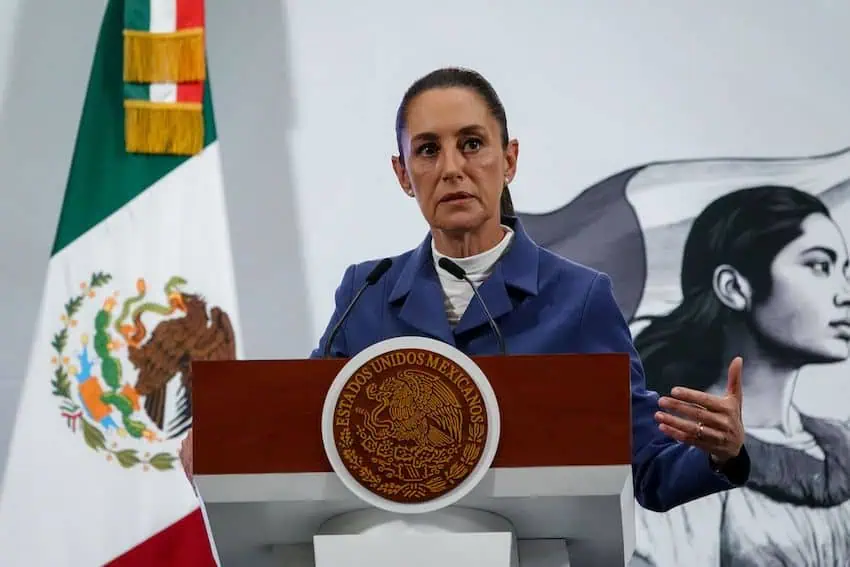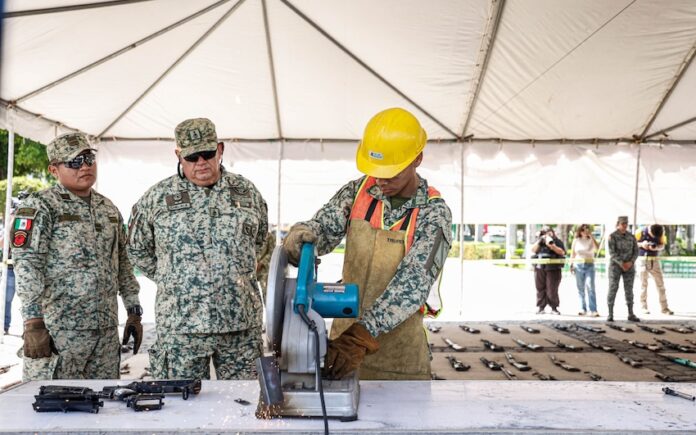The current government of Mexico is seizing firearms at twice the rate of the administration of former president Andrés Manuel López Obrador, statistics show.
The federal government reported earlier this month that 17,283 firearms were confiscated between Oct. 1, 2024 and Sept. 30, 2025, a period that coincides with the first year of Claudia Sheinbaum’s presidency.
During López Obrador’s six-year term, an average of 8,564 firearms were seized on an annual basis. That figure is equivalent to 49.5% of the number of firearms confiscated during the first year of Sheinbaum’s presidency. Federal security forces including the army, navy and National Guard are responsible for most firearm seizures in Mexico.
The 17,283 firearms seized in the 12 months to Sept. 30 is equivalent to 33% of the 51,384 guns confiscated during the best part of López Obrador’s presidency. The ex-president cited the figure of 51,384 in his sixth and final annual report to the nation, delivered in a speech a month before he left office.
Security Minister Omar García Harfuch said Oct. 7 that the seizure of weapons reduces the firepower of criminal organizations and results in “less violence on the streets.”
Homicides declined almost 25% annually in the first nine months of 2025.
Most seized weapons came from the US
The Sheinbaum administration has taken a less passive approach to combating organized crime than the previous federal government. In addition, it has implemented a new security strategy with four core tenets including the strengthening of intelligence and investigative practices.
The more active approach to law enforcement coupled with improved intelligence and investigation could help explain the increase in firearm seizures over the past year.

According to Security Ministry data, 70% of the guns confiscated during the first year of the Sheinbaum presidency were brought into Mexico from the United States.
The illicit southward flow of firearms from the U.S. has long been a problem in Mexico, fueling the violent crime that plagues various parts of the country. Many of the hundreds of thousands of weapons smuggled across the border on an annual basis end up in the hands of members of Mexico’s notorious drug cartels. They are frequently used to commit high-impact crimes including murder.
Almost three-quarters of the more than 14,000 homicides in Mexico between January and August were committed with firearms.
Mission Firewall
In late September, the Mexican and U.S. governments announced the launch of a new bilateral initiative aimed at disrupting the southward flow of illicit weapons across the Mexico-U.S. border.
The joint project is called “Mission Firewall: United Against Firearms Trafficking Initiative.”
Mexico’s Foreign Ministry said that the “main goals” of Mission Firewall include increasing border operations to prevent weapons from entering Mexico from the U.S. and expanding use of the eTrace tool to strengthen firearms investigations in both countries.
During a visit to Mexico in early September, U.S. Secretary of State Marco Rubio pledged that the U.S. government would “stop the flow of armaments” to Mexico and other Western Hemisphere countries.
Mexico and US launch Mission Firewall to stop cross-border gun trafficking
“And it’s not just Mexico, by the way. Those arms are flowing to Haiti, they’re flowing to Jamaica, they’re flowing to Trinidad, they’re flowing into the Caribbean and we’re going to put a stop to it,” he said.
The Mexican government has long called on its U.S. counterpart to do more to stem the southward flow of weapons, and has complimented the Trump administration for heeding that message.
It also sued a number of United States-based gun manufacturers and distributors, accusing them of negligent business practices that have led to illegal arms trafficking and deaths in Mexico. The United States Supreme Court threw out Mexico’s US $10 billion lawsuit in June, but the Mexican government has continued to push U.S. authorities to crack down on arms trafficking to Mexico, where guns are only sold legally at two army-run stores.
With reports from Expansión Política
